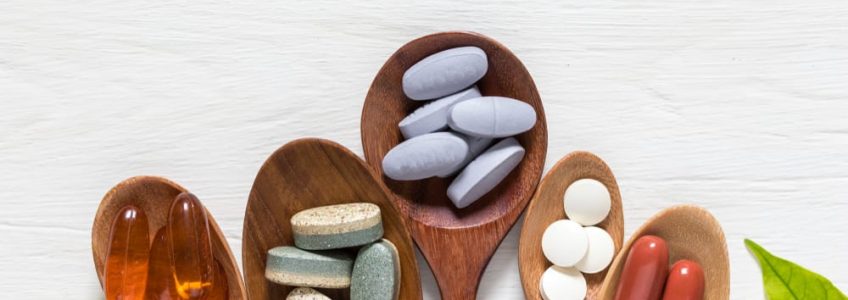
When it comes to health and wellness, bone health does not always receive the attention it deserves until later in people’s lives. Too often, this change comes after the opportunity to support long-term bone health has passed.
Your bones give your body shape, produce red blood cells, store crucial minerals, protect vital organs, and enable the movement of work and play. Sometimes diet restrictions, appetite loss, digestive disorders, or other factors can affect your ability to get the variety of nutrients you need. In this case, supplements and vitamins may be a way to enhance your dietary intake.
Calcium
Calcium is the healthy bone mineral. About 99 percent of the Calcium in the body is stored in the bones and teeth. It is the mineral that makes them hard and strong. The remaining 1 percent is needed for many activities that help keep the body functioning normally. Your body maintains blood levels of Calcium within a narrow range. If you’re not getting Calcium from the diet, your body pulls it from your bones to sustain other functions that are more important for immediate survival.
Bones are constantly being remodeled every day, and Calcium is moving in and out of them. In children and adolescents, the body builds new bone faster than it breaks down old bone so total bone mass increases. This continues until about age 30, when new bone formation and old bone breakdown start occurring at about the same rate. In older adults, especially in post-menopausal women, bone is broken down at a faster rate than it is built. If Calcium intake is too low, this can contribute to osteoporosis.
It is recommended that women consume 1,000-1,200 mg of Calcium per day through a combination of food and, if needed, supplements.
Milk and dairy products (such as milk, yogurt and cheese) are the most readily available sources of Calcium in the diet.
Other sources of Calcium include:
- Green vegetables like broccoli and kale
- Some fruits such as oranges and apricots
- Canned fish with soft, edible bones (the Calcium is in the bones) such as sardines and salmon
- Nuts, especially almonds
- Tofu
Vitamin D
Vitamin D plays a crucial role in bone health. Emerging science has shown that vitamin D allows Calcium to be sufficiently absorbed in the gut and used by the body.
Unlike Calcium, Vitamin D is not naturally present in many foods. The best source of vitamin D is through direct sun exposure during the brightest part of the day. Of course, not everyone is fortunate enough to reside in a region where this is possible year round. For this reason, supplementation is often recommended.
Adults older than age 50 should take between 800 and 1,000 international units, or IUs, of vitamin D a day.
Magnesium
Magnesium is an essential mineral for the overall health of the body and is found naturally in foods like whole-grain breads, dark green vegetables, and nuts. Magnesium and Calcium work together closely to maintain strong bones. Approximately 50-60% of the body’s Magnesium is stored in the skeletal system. Due to its importance to the skeletal system, both structurally and functionally, it cannot be left out of any discussion of bone health.
If you eat a lot of processed foods, you likely do not get enough Magnesium in your daily diet. Magnesium is plentiful in nuts, leafy green vegetables, and beans. If you are not regularly eating these foods, consider a Magnesium supplement, especially if you consume alcohol or caffeine, which both deplete Magnesium levels in the body.
While it is possible to get a Magnesium supplement, Magnesium is often incorporated into a daily multivitamin. The recommended daily amount of Magnesium is 300 to 500 mg. An ideal balance is two parts Calcium to one part Magnesium. If your multivitamin has 1,000 mg of calcium, it should have 500 mg of Magnesium.
Watch for signs of excess Magnesium, such as stomach upset and diarrhea. These symptoms indicate you should cut back on Magnesium.
Vitamin K
Vitamin K comes in two forms — K1 and K2. Vitamin K1 is found primarily in green, leafy and cruciferous vegetables (including Swiss chard, broccoli, cabbage, Brussels sprouts, cauliflower, watercress, radish, arugula, spinach, turnip, kale, and bok choy). Vitamin K2, which is predominantly produced by bacteria, is further divided into subgroups named MK4 to MK13. These are found in some dairy products, pork, poultry and fermented foods.
Vitamin K2 may have more of a protective effect on bone than vitamin K1. However, deficiencies of both K1 and K2 appear to have a negative effect.
An adequate intake of vitamin K is considered to be 120 mcg for men and 90 mcg for women. A true vitamin K deficiency, which is marked by an inability of blood to clot normally and easy bruising, is rare.
Boron
One of the most interesting things about your body is how different nutrients work together to help each other out. You could almost say they need each other to perform at their best. Boron, calcium, and Magnesium share this kind of special relationship, working together to help your body build and preserve bones. Calcium is the cornerstone of healthy bones and teeth. And Magnesium helps increase bone density. About 60% of the Magnesium in your body is in bone, where it helps you use calcium. And Boron helps your body retain more Calcium and Magnesium by reducing the amount of each that’s lost through urine.
Boron is a trace element, which means that your body does not need large amounts of it, yet it is important because it enables your body to effectively use calcium. As well, Boron has properties that aid in the treatment of osteoporosis by activating vitamins and minerals necessary for healthy bone formation.
Boron is not commonly found in multivitamins. It is found naturally in foods like apples, grapes, nuts, peaches, and pears. You need between 3 and 5 mg of Boron a day to help treat osteoporosis.
Silicon
Silicon is another trace mineral that’s important for the development of healthy bones, as well as tendons and ligaments. Our bones go through a complicated process of growth, modeling or consolidation, and remodeling—the latter of which happens throughout our lives. So just because bone formation happened and your bones are healthy and strong does not mean they will stay that way. Remodeling refers to the process that happens when bone is broken down and formed again, not always in the same way—or at the same quality. The strength of our bones is determined by two factors: bone mineral density (BMD), how many of those mineral crystals there are in an area of bone, and bone matrix quality, which is basically everything about the bone’s structure and composition that doesn’t involve minerals.
Like Boron, Silicon is not commonly found in multivitamins. Taking an estimated 25 to 50 mg of Silicon a day may help a woman with osteoporosis.
Who Should Take Supplements
If you’re able to eat a healthy diet full of lean proteins, whole grains, fruits, and vegetables, you may get enough of the nutrients you need in your daily diet. However, when you have osteoporosis, your doctor will likely recommend supplementing your daily diet.
Other reasons you may need Calcium supplements:
- You eat a vegan diet.
- You are lactose intolerant.
- You are taking corticosteroid medications on a long-term basis.
- You have a digestive disease that may impact your body’s ability to absorb calcium, such as inflammatory bowel disease or celiac disease.
- You are currently being treated for osteoporosis.
Contact Ventura Orthopedic Today
If you are concerned about your bone health, our specialists are always willing to help you reach your optimal health. Osteoporosis is a very serious disease.
To learn more about bone health or to schedule an appointment with one of our specialists, call us at 800-698-1280.

